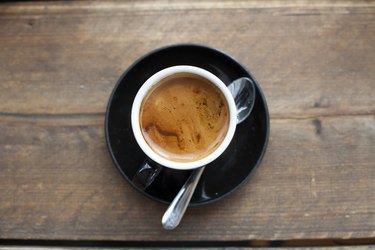
According to the USDA, America is the second-largest importer of coffee beans worldwide. Caffeine is a naturally occurring substance in your morning java, unless you drink decaf. But, if you're looking for the most caffeinated coffee, a lot of variables come into play.
Read more: Long-Term Effects of Caffeine
Video of the Day
Video of the Day
Tip
There's no one kind of java that can be called the most caffeinated coffee. Caffeine content depends on the type of roast and beans, as well as the brand.
Light Roast Vs. Dark Roast
When you peruse coffee labels, you will likely see a roast type: light, medium or dark. This is an indicator of flavor strength, with the most mild being light roast vs. dark roast having the boldest taste. The darker the beans, the longer they have been roasted.
While a stronger dark roast might seemingly have a higher caffeine content, this is not true based on the roasting process. The longer coffee beans are roasted, the more caffeine is burned off.
Light roast coffee isn't as strong, but they pack the most caffeine, according to the National Coffee Association.
Know Your Beans
Coffeehouses often pride themselves on the types of beans they roast. This can dictate flavor, as well as caffeine content. Most brands use either Arabica or robusto coffee beans, the latter of which has the most caffeine.
Arabica beans contain about half the caffeine of their robusto counterparts, according to an article published in the August 2016 issue of the journal European Food Research and Technology.
Understanding Brewing Techniques
Once the beans are roasted, long brewing times can also lead to more caffeine. A traditional drip maker with a filter tends to bear the most caffeine because of its long brewing time of five minutes.
A French press, also called a "plunger pot," brews two to four minutes, so you may end up with slightly less caffeine. A shot of espresso has the least caffeine because the coffee is in water for only 20 to 30 seconds. But because of the small serving size, it's more concentrated.
If you're looking for the strongest coffee in stores, keep in mind that the caffeine content in your cup of joe can even vary by brand.
Specialty drinks aren't much healthier. Before you choose a latte over regular coffee, keep in mind that even though it might not have as much coffee — thus not as much caffeine — added creams and sugars can lead to more calories and fat.
Staying Under the Limit
Consuming too much caffeine can be a real concern, as it can cause unwanted side effects such as irritation, restlessness and increased urination. According to Mayo Clinic, for healthy adults, consuming up to 400 milligrams of caffeine per day is considered safe. This equates to four brewed cups of coffee.
Also be aware of other forms of caffeine you may consume on a given day, and plan accordingly. Caffeine is primarily plant-based, but it is sometimes manufactured and added to products and foods.
Before getting another cup of coffee on a given day, consider other sources of the substance you plan on having, such as soda, tea, chocolate and aspirin. Caffeine can also affect you more as you age.
- European Food Research and Technology: "Chlorogenic Acids, Caffeine Content and Antioxidant Properties of Green Coffee Extracts: Influence of Green Coffee Bean Preparation"
- Mayo Clinic: "Caffeine: How Much Is Too Much?"
- National Coffee Association: "Coffee Roast Guide"
- USDA: "Coffee: World Markets and Trade"